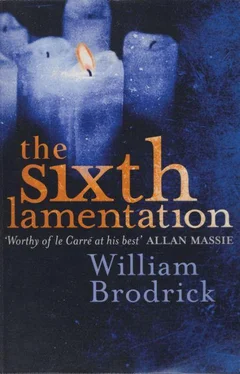William Brodrick - The Sixth Lamentation
Здесь есть возможность читать онлайн «William Brodrick - The Sixth Lamentation» весь текст электронной книги совершенно бесплатно (целиком полную версию без сокращений). В некоторых случаях можно слушать аудио, скачать через торрент в формате fb2 и присутствует краткое содержание. Жанр: Триллер, на английском языке. Описание произведения, (предисловие) а так же отзывы посетителей доступны на портале библиотеки ЛибКат.
- Название:The Sixth Lamentation
- Автор:
- Жанр:
- Год:неизвестен
- ISBN:нет данных
- Рейтинг книги:5 / 5. Голосов: 1
-
Избранное:Добавить в избранное
- Отзывы:
-
Ваша оценка:
- 100
- 1
- 2
- 3
- 4
- 5
The Sixth Lamentation: краткое содержание, описание и аннотация
Предлагаем к чтению аннотацию, описание, краткое содержание или предисловие (зависит от того, что написал сам автор книги «The Sixth Lamentation»). Если вы не нашли необходимую информацию о книге — напишите в комментариях, мы постараемся отыскать её.
The Sixth Lamentation — читать онлайн бесплатно полную книгу (весь текст) целиком
Ниже представлен текст книги, разбитый по страницам. Система сохранения места последней прочитанной страницы, позволяет с удобством читать онлайн бесплатно книгу «The Sixth Lamentation», без необходимости каждый раз заново искать на чём Вы остановились. Поставьте закладку, и сможете в любой момент перейти на страницу, на которой закончили чтение.
Интервал:
Закладка:
‘He gave me absolution,’ Victor remembered, ‘but he refused to give me a penance. Keep talking to Pauline, he said. And I did. But her kidneys packed up and she died. That’s when I started drinking.’
All the family thought it was grief, which was true, but it was also the other burden he could no longer carry alone. He attended an expensive rehabilitation programme sorted out by Robert and found it completely humiliating — not because he was proud but because he could not disclose the reasons for his collapse.
‘They thought I was “avoiding the pain required to face the truth about myself”. I found that judgment distinctly unpalatable. It was, as with so much of my life, a hideous misunderstanding.’
They sat in silence until Anselm rose. He had a train to catch.
‘Robert will have to be told everything,’ Victor said, exhausted. ‘Difficult as that might be, the thought of it done is like… an accomplishment.’
‘I have already arranged to see him,’ said Anselm.
Cautiously, reflectively. Victor said, ‘It’s all been an inexplicable mix of misfortune and luck. But since I’m a religious man, I look to Providence. Only that rather complicates things, don’t you think? Because there’s no accounting for the graces received, set against what went wrong, without hindrance, for so long.’
Anselm didn’t have a reply for that particular observation.
2
Lucy met Father Anselm on the forecourt of Liverpool Street Station. She had wanted to see him before he went back to Larkwood Priory, to say thank you, and had duly rung him at St Catherine’s the night before. The monk stood behind his suitcase like one of those carved statues on the front of a cathedral, observing the passing world on its busy way to somewhere important. He saw her and raised a hand.
Lucy said, ‘I’m told it’s because of you I’m not going to be charged.’
‘That’s not strictly true,’ replied the monk. ‘Detective Superintendent Milby and I go back a long way He’d never have put you through the system if he could help it. But what you did was remarkably daft, wasn’t it?’
‘At the time I was watching myself,’ said Lucy. ‘It was as though the whole episode was part of a play and once I’d started writing the script I couldn’t stop. At last I was in control. I could choose the ending. But it was unreal. I just wanted to rehearse what it would be like and see it through to the end.’ She felt again the queasy warmth of guilt passed by ‘Detective Inspector Armstrong told me that, once cocked, the trigger was so light it could have gone off in my hand without me even touching it.’
‘And you would have killed the last knight of The Round Table,’ said Father Anselm, ‘the man who saved Robert. It doesn’t bear thinking about.’ The monk went on to give a short account of Victor’s true position in the weave of events. Horrified at the magnitude of her error, humbled and ashamed, Lucy said, ‘Someone must have been looking after me.’
‘I know what you mean,’ replied the monk pensively ‘That is a phrase upon which to ponder.’ He glanced at the departure board. ‘I’m afraid I have to go.
Lucy walked with him along the platform. ‘I must tell my father who he is.’
‘Yes… and I must tell Robert Brownlow whose son he is.’
Lucy felt the first stirrings of an idea that she knew would fulfil itself. She had a sense of festival, streamers, a family outing. Father Anselm stopped by the train door and said: ‘Did you know that Salomon Lachaise was saved by The Round Table?’
‘No.’ She thought of the gentleman who had become her friend, having at one definite point in the course of the trial sought her out, along with Max Nightingale. ‘And yet he didn’t sit with the other survivors.
The monk looked at her curiously ‘How strange. I didn’t realise that…’
Lucy’s idea took a firm shape:
‘I’d like to bring all these people together, before my grand-mother dies. They all belong in the same room.
Surprised agreement lit the monk’s face.
She said, ‘Would you come.’ Father?’
‘Thank you, and remember… I’m also a messenger from the past.’
A messenger: somehow, despite the long, unrelenting conspiracy of misfortune, a letter had been passed on, as by runners at night, despite the guns, despite the wire. It would be brought to Agnes just before she died.
A man in a tired uniform appeared, urging stragglers to get on board. The one remaining question fell from her lips as the door began to swing on its dirty hinge: ‘I wonder what Mr Lachaise said to Schwermann…’
‘Yes, I wonder,’ replied the monk.
The door banged shut. A loud whistle soared over the carriages. The train heaved forwards, clattering on the rails. The man in uniform walked quickly past, his job done. And Father Anselm, his face framed by a grimy square of glass, moved away.
Chapter Forty-Six
Salomon Lachaise said he wanted to come to Larkwood. He needed some time to be alone and asked if he might stay at The Hermitage. The Prior granted his permission. For three days the Priory’s guest wandered in the woods, along the stream and round the lake. Then, one morning, Anselm found a note in his pigeonhole. Salomon Lachaise would welcome a visit.
Anselm walked quickly through the fields after lunch. About two hundred yards from The Hermitage was a narrow wooden footbridge, without railings, spanning the stream. The small man sat upon the timbers. Silently, Anselm joined him. Their legs hung loose over the edge.
Salomon Lachaise said, ‘Do you remember, before the end of the trial, saying you had been one person with me while all the while you were another?’
‘Yes. You replied that that was true of all of us.’
‘Your memory serves you well.’
‘I wondered what you meant. ‘
‘I’m not sure I’ll ever be able to explain. But I will try. You know that I learned early on in my life that I was one of the few who had escaped… that my whole family had been taken away. I kept the memory of their names alive. I told you that I found peace in scholarship, that I owed the outset of my academic life to a survivor.’
‘Yes.’ I remember.’
For a short while Salomon Lachaise pondered the rush of water beneath his feet. He said, ‘My life changed on a bright, cold morning just after a lecture on feudal iconography I walked into the common room at the University and picked up a newspaper. A journalist had discovered that… that man… had found refuge in Britain after the war.’
‘Pascal Fougeres was the author?’
‘Yes. I decided to contact him, and told my mother. No, she said, dear God, no. Leave the past alone. I turned to Mr Bremer — I told you about him when we first met — the lawyer who had become my guide. He, too, had seen the article. He, too, advised me to get on with my life
… to forget what I had read.’
‘Did you?’
‘No.’
Salomon Lachaise proceeded in a low monotone. ‘I went to see Mr Bremer. I told him my mind was made up; I was going to join myself to those who were seeking that man. I asked for his support before I told my mother.’
‘You received it?’
‘No. It would be right to say he lost his professional detachment.’
‘Why?’
‘The article we had both read gave the name of the small town that man had come from…Wissendorf… Mr Bremer recognised it from his dealings with the lawyer retained by my benefactor. He made what I think is called a reasonable assumption of fact. My refusal to heed his advice forced him to tell me that the German lawyer acting on behalf of the “survivor” was the family solicitor for… that man.’
‘Schwermann was the… survivor?’ asked Anselm, aghast at the appropriation of the word.
Читать дальшеИнтервал:
Закладка:
Похожие книги на «The Sixth Lamentation»
Представляем Вашему вниманию похожие книги на «The Sixth Lamentation» списком для выбора. Мы отобрали схожую по названию и смыслу литературу в надежде предоставить читателям больше вариантов отыскать новые, интересные, ещё непрочитанные произведения.
Обсуждение, отзывы о книге «The Sixth Lamentation» и просто собственные мнения читателей. Оставьте ваши комментарии, напишите, что Вы думаете о произведении, его смысле или главных героях. Укажите что конкретно понравилось, а что нет, и почему Вы так считаете.












